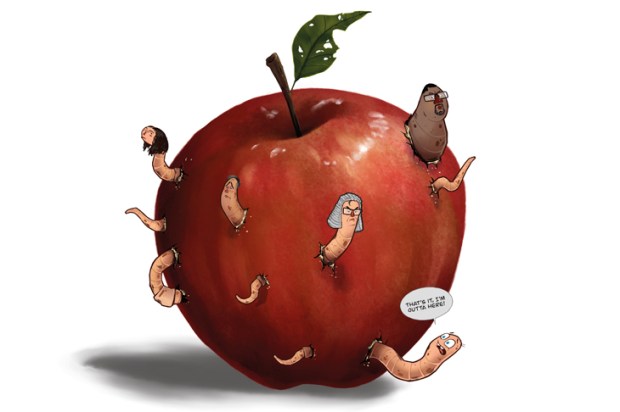Unlike the Australian political system which was largely adopted from the UK – with a few modifications from the United States – Americans had long and detailed debates about the nature of their polity.
It is true that the leaders of colonial Australia debated the provisions of the proposed constitution at a number of conventions in the late 1800s, but few of these discussions examined the underlying philosophical basis of the nation’s political system. Instead, they concentrated on the mechanics of the constitution.
Amongst the debates by the American founders, the writings of Alexander Hamilton, James Madison and John Jay were significant. Almost two and a half centuries later, they remain a clear expression of the central issues still facing the nation.
Known as the Federalist Papers, the collection remains pertinent today for a consideration of the challenges of constructing and maintaining democratic institutions.
Much has been made of James Madison’s observations about the necessity for government to control itself as a counterbalance to the ability of the government to control the governed. This is of growing concern in the US – and to a lesser extent in Australia – as governments have increasingly used police and other agencies to place unnecessary constraints on citizens. A government that cannot control itself risks a steady slide into totalitarianism. Madison’s antidote was the control of the executive by the legislature in a republic. But what happens when the executive abuses the power given to it, even to the extent of manipulating the law to achieve its goals? This is a serious question now confronting the US.
A more contemporary discussion in the Federalist Papers concerns the judiciary and is in a series of letters from Alexander Hamilton to the people of the State of New York. Hamilton considered the respective roles of the executive, the legislature and the judiciary, concluding that ‘the judiciary, from the nature of its functions, will always be the least dangerous to the political rights in the constitution, because it will be the least in a capacity to annoy or injure them.’
Comparing the three arms of government, Hamilton observed, ‘The Executive not only dispenses the honours, but holds the sword of the community. The legislature not only commands the purse, but prescribes the rules by which the duties and rights of every citizen are to be recognised. The judiciary, on the contrary, has no influence over either the sword or the purse; no direction either of the strength or of the wealth of the society; and can take no active resolution whatever. It may truly be said to have neither FORCE nor WILL, but merely judgement; and must ultimately depend upon the aid of the executive arm even for the efficacy of its judgements.’
Referencing Montesquieu, Hamilton concluded that the judiciary is the weakest arm of government, as long as it remains distinct from the executive and the legislature. But he placed two caveats on that conclusion. First, he recognised that ‘individual oppression may now and then proceed from the courts of justice’. Secondly, in another letter, he supported the permanency of judicial appointments and the proper provision for people appointed to the bench.
It is these matters that command attention today, as an increasing number of participants in the American justice system appear motivated by partisan politics. Many prosecutors are elected on clearly partisan platforms, as are some judges; while others do little to disguise their political affiliations or support.
Throughout the writings under the nom de plume Publicus, Hamilton especially highlighted the significance of virtue and wisdom as critical characteristics of a well-functioning system of government. His insistence on mature reflection seems absent from many contemporary governments: ‘when occasions present themselves, in which the interests of the people are at variance with their inclinations, it is the duty of the persons whom they have appointed to be the guardians of those interests, to withstand the temporary delusion, in order to give them time and opportunity for more cool and sedate reflection.’ The pursuit of virtue and wisdom, and cool and sedate reflection seem missing from much of the contemporary polity.
Can the US recover from its current malaise? Partisan politics appears to have seriously undermined the republican model so valued by the founders of the nation. The problem is that a tit-for-tat mentality appears to have infested the leadership of the nation. Modesty is missing; excesses are celebrated; and political revenge is to the fore. Quiet decorum and mature reflection have been replaced by cantankerous voices seeking to outshout each other in the public square. The US has shown an ability to overcome other challenges in the past, but it is difficult to see how the current malaise will be righted short of a major shock to the nation. At a time when democracy is under renewed attack and the free world desperately needs global leadership, the decline of the US is worrying.
These considerations are pertinent to the recent suggestions that Australia adopt a bill of rights. To date, Australians have experienced very little judicial interference in the political process. Courts have generally confined their considerations to the interpretation of the laws made by parliament, along with the application of the common law. This is a far cry from the American system where adventurous judicial interpretation is often rife.
It is compounded in the US by the election of judges and prosecutors who increasingly manifest strong party-political biases. So-called ‘lawfare’ has compounded as decisions traditionally in the realm of politics are now being taken by courts. We in Australia are not completely free of these developments. Some years ago, when moving the admission to the practice of a friend, I was surprised to hear from the then chief justice that counsel needed to be mindful that Victoria’s Charter of Human Rights applied to every aspect of the law, along with encouragement to make use of it.
The totalitarian tendency is to obliterate the various spheres of national life and subject them to the power and control of the state. This tendency is not only at work in authoritarian states; it can be seen in democracies also.
Got something to add? Join the discussion and comment below.
You might disagree with half of it, but you’ll enjoy reading all of it. Try your first month for free, then just $2 a week for the remainder of your first year.













